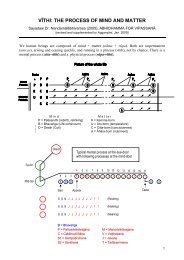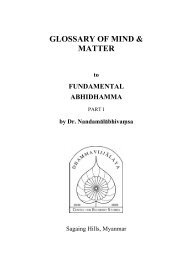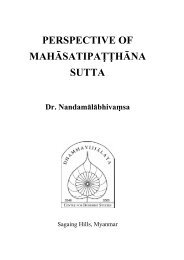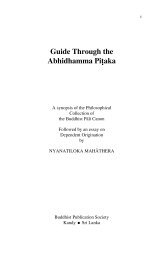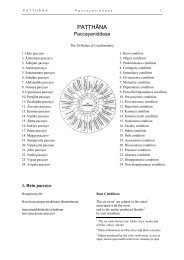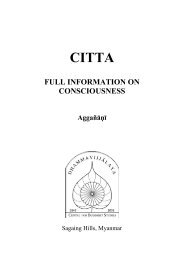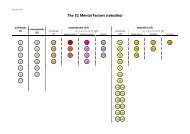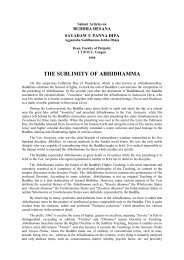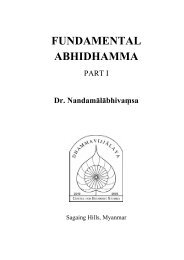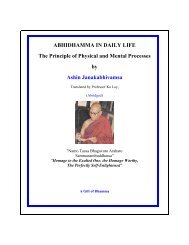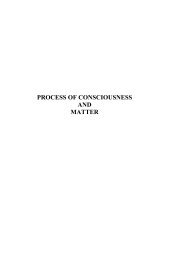Mahathera Ledi Sayadaw - Abhidhamma.com
Mahathera Ledi Sayadaw - Abhidhamma.com
Mahathera Ledi Sayadaw - Abhidhamma.com
Create successful ePaper yourself
Turn your PDF publications into a flip-book with our unique Google optimized e-Paper software.
Let us explain this more clearly. When there arise great and difficult manly enterprises, the<br />
ac<strong>com</strong>plishment of such enterprises necessitates the arising of these four dominants. How When<br />
ill-intentioned people encounter any such enterprise, their intention recedes. They are not willing<br />
to undertake it. They leave it, having no inclination for it, and even say: "The task is not within<br />
the range of our ability." As to well-intentioned people, their intention be<strong>com</strong>es full of spirit at the<br />
sight of such a great enterprise. They are very willing to undertake it. They make up their mind to<br />
ac<strong>com</strong>plish the task, saying: "This has been set within the orbit of our ability." A person of this<br />
type is so persuaded by his intention that he is unable to give up the enterprise during the course<br />
of his undertaking, so long as it is not yet ac<strong>com</strong>plished. And since this is the case the task will<br />
some day arrive at its full ac<strong>com</strong>plishment even though it may be a very great one.<br />
Now, let us turn to the case of men of the indolent class. When they <strong>com</strong>e face to face with such a<br />
great task they at once shrink from it. They shrink from it because they foresee that they will have<br />
to go through great hardships and also undergo bodily and mental pain if they wish to ac<strong>com</strong>plish<br />
it. As to the industrious man, he be<strong>com</strong>es filled with energy at the sight of it and wishes to set<br />
himself to it. He goes on through thick and thin with the performance of the task for any length of<br />
time. He never turns back from his exertions, nor does he be<strong>com</strong>e disappointed. What he only<br />
thinks about is that such a great task cannot be ac<strong>com</strong>plished without unswerving efforts every<br />
day and every night. And this being the case, the great task will certainly reach its end one day.<br />
Let us take the case of the feeble-minded. They also turn away when they see such a great task.<br />
They will certainly never think of it again. But it is quite different with the strong-minded person.<br />
When he sees such a task he be<strong>com</strong>es highly interested in it. He is quite unable to dispel the<br />
thought of it. He is all the time wrapped up in thoughts about the task, and at its bidding sets<br />
himself to it for a long time, enduring all kinds of bodily and mental pain. The remainder should<br />
hereafter be explained in the same manner as the dominant intention above.<br />
Again a few words about unintelligent men. When they are confronted with such a task they<br />
be<strong>com</strong>e blinded. They know not how to begin, nor how to go on with the work, nor how to bring<br />
it to its end. They feel as if they had entered the dark where not a single light of inclination<br />
towards its performance has been set up to guide them. On the other hand--to take the more<br />
intellgent case--when a person of this type has to tackle such a great task he feels as if he were<br />
lifted up to the summit of his intellect, whereupon he discerns whence to start and whither to end.<br />
He also knows what advantage and blessing will accrue to him from its performance. He invents<br />
many devices for its easy ac<strong>com</strong>plishment. He continues on with the work for a long time, and so<br />
on and so forth. The rest should be explained in the same manner as the dominant effort--only<br />
inserting the words 'with an enormous amount of investigation' in place of 'unswerving efforts'.<br />
Thus, when there arise great and difficult manly enterprises, these four dominants be<strong>com</strong>e<br />
predominant among the means of their ac<strong>com</strong>plishment. Owing to the existence of these four<br />
dominants there exist distinguished or dignified persons (personages) such as the Omniscient<br />
Buddhas, the Pacceka Buddhas,[12] the most eminent disciples, the great disciples and the<br />
ordinary disciples. Owing to the appearance of such personages, there also appear, for the general<br />
prosperity and welfare of mankind numerous[13] arts and sciences, as well as general articles of<br />
furniture to suit and serve human needs and wants under the canopy of civilization.<br />
End of the Adhipati-Relation.<br />
4. Anantara-Paccaya or the Relation of Contiguity<br />
What is the Anantara-paccaya All classes of consciousness and their mental con<strong>com</strong>itants, which<br />
have just ceased (in the immediately preceding instant), are anantara-paccayas. Which are those<br />
that are related by this paccaya All classes of consciousness and their mental con<strong>com</strong>itants,<br />
which have just arisen (in the immediately succeeding instant), are related by this paccaya.




